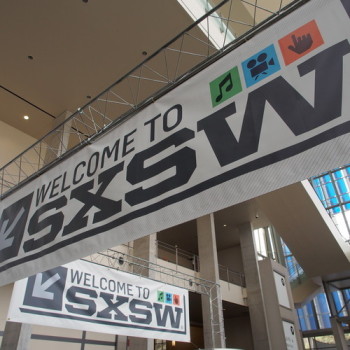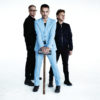Each March, practically half of the known world flocks to Austin, Texas for the mega arts festival South-by-Southwest. Hard to believe, for a gathering that began with a few dozen local bands. Co-founder Louis Black chats with Rico about why it caught fire, the tears that fuel the fest, and a memorable close-up with Johnny Cash.

Rico Gagliano: Louis Black co-founded the South by Southwest festival. The 26th of which, I believe kicks off in Austin, Texas this week. Is that right, the 26th?
Louis Black: I think it’s actually the 27th.
Rico Gagliano: Man, and it started as kind of a festival for the music industry, where sort of professionals would go and see all these bands at venues around the city. You have since added film and interactive media festivals. They all happen around the same time as the music festival.
How many attendees are you expecting to show up for the three festivals this year?
Louis Black: You know, it’s in the tens of thousands.
It’s over 2,000 acts coming, so that’s you know 10,000 people. There’s film makers, there’s registrants, and then there’s a lot of people who just come for the films or the music.It’s estimated at over a hundred thousand to two hundred thousand.
Rico Gagliano: You’re significantly adding to the population for a few weeks. Now, this is not how things started back in 1987. Tell us the scale of the thing that first year.
Louis Black: So the original idea was just to have this small regional gathering and much to our amazement 700 people showed up and 200 bands.
Rico Gagliano: 700 people!
Louis Black: 700 people.
Rico Gagliano: This was a pretty DIY sort of thing at first. Do you remember the moment where you thought, “Okay this is getting bigger than me and my friends can put together any more?”
Louis Black: There’s not one moment where I suddenly realized this thing’s a monster. There’s many, many, many moments.
Rico Gagliano: What’s the most frightening?
Louis Black: The second year we had Joe Ely playing in a ballroom at a hotel and we really didn’t have sufficient security to keep people from coming into the ballroom, and the stage was low so people were standing on chairs, climbing up on each other’s shoulders, and it was packed.
We began to realize that potentially this could be a very dangerous situation.And so you had Roland and I standing on the stairs up to the ballroom together, like holding hands trying to keep people from coming up, both semi-hysterical trying to control the crowd.That was, it was one of those moments when we realized, “Oh this is bigger than us.”
Rico Gagliano: What do you attribute the success to? What made this festival as opposed to any other music industry festival just suddenly blow up?
Louis Black: Austin, Texas.
Rico Gagliano: It’s just the location.
Louis Black: You know, when we started this, in the decade, fifteen years after we first did it, a hundred and fifty, two hundred other cities did it. We did it in three or four other cities and it didn’t work for anybody. And one of the reasons I’ve come to realize is Austin had more, let’s say cult bands, bands that could play in Scandinavia or in the Midwest or the East Coast and attract a real devoted crowd, but they weren’t top 10 bands or top 40 bands. Most other places either had, you know A acts or acts nobody had ever heard of. Friends of ours do a similar event in Toronto and when they started they were friends with all the biggest Canadian bands.
Rico Gagliano: Rush
Louis Black: Blue Rodeo, Rush.
Rico Gagliano: That’s it, right? I think that’s all of them.
Louis Black: No, Tragically Hip. Tragically Hip is the biggest Canadian band. You can’t believe how popular they are in Canada.
Rico Gagliano: I can believe it.
Louis Black: And they were friends with all those, and Cowboy Junkies. None of those bands could play a little club or even a reasonable sized club without causing a riot.
Rico Gagliano: That said though, this festival now pretty much engulfs Austin for about a week and a half. I mean, there are ancillary parties that happen all over the city. Traffic patterns change. I’m sure the local cab companies must double their staff that week. I imagine that it might be scary to pull this thing off at this point. There’s so many variables that could go wrong and so many people depending on you to get it right.
Louis Black: You know, my role has changed over the years to where I’m not as involved in day-to-day planning as I used to be, so I’m not as strung out or as tense or as messed up as I used to be.
But Roland, who’s my partner, who is the hands-on daily manager, he gets stiffer and stiffer. Roland’s really good at repressing things. He always seems very calm, but I just notice that he walks stiffer and stiffer as the event gets closer.
We start in the beginning of February with Saturday meetings with like a hundred and fifty, two hundred people, so we can go over all this information together and one of the things that will come up several times in each of these meetings is, if you start crying, that’s okay. Everybody starts crying. You know, just don’t get to hysterical about it. Try and go off where you need to go and cry and then it’ll be alright.
Rico Gagliano: I have to ask you. Just about every band ever has played South By at some point, and in some cases way before they were stars. I want to know, what’s the band that you managed to catch when they were nobodies who then blew up? Is there one that stands out?
Louis Black: You know, there isn’t one that stands out. The show that stands out in my mind is Johnny Cash when he launched his comeback recording on American and he came and he played with the Tennessee Three, although they were two at the time, and then did half a set of old material and half a set of new material at Emo’s, which is just a small little club. That certainly is one of those moments that I remember catching.
I don’t really recall, you know, some band that I knew nothing about that blew me away, mostly because one of the other things we say at these Saturday meetings is, “Remember South by Southwest is not for you.” You know, you’re not here to enjoy it, you’re here to make sure everybody else enjoys it.
Rico Gagliano: Which is maybe one of the reasons why it succeeds, because you guys don’t actually have any fun.
Louis Black: Exactly. And sometimes they’ll give a list of all these great shows and they’ll go, and remember, you can’t go.
Rico Gagliano: One last question to you. I’ve been to South by several times. It often coincides with St. Patrick’s day. Whose genius idea was that and why would you do that to yourself?
Louis Black: Oversight. We didn’t start this, I think we started it as a two or three day event. I don’t think we ever expected it to expand into ten day event.
Rico Gagliano: So it just grew into St. Patrick’s day?
Louis Black:
We tried to move St. Patrick’s day, we didn’t think that was too unreasonable.No, it gets a little out of hand. Every night is so intense and there’s so much going on, as you said there’s parties in every direction for miles, but St. Patrick’s ups the ante where the ante can’t be upped.


